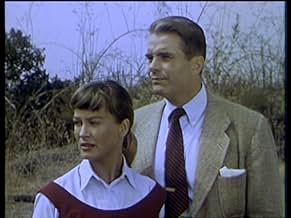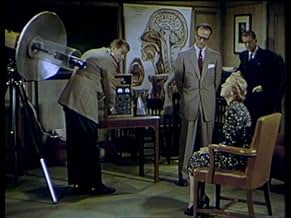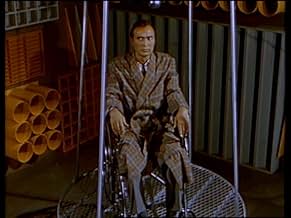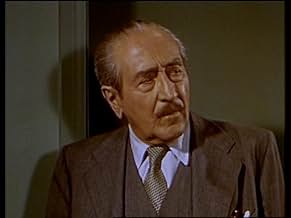Truman Bradley introduce historias basadas en datos científicos de los años 50, enfocándose en conceptos como viajes espaciales, OVNIs y telepatía mental.Truman Bradley introduce historias basadas en datos científicos de los años 50, enfocándose en conceptos como viajes espaciales, OVNIs y telepatía mental.Truman Bradley introduce historias basadas en datos científicos de los años 50, enfocándose en conceptos como viajes espaciales, OVNIs y telepatía mental.
Explorar episodios
Opiniones destacadas
In the mid-50's, even prior to the launching of Sputnik, America's interest in science was increasing. This anthology came along in syndication for two years in 1955-56, and to a young 10 year old it was a revelation that few things were as endlessly fascinating as science. Even though the plots often spun off into the realm of the fantastic, they all revolved around some basic scientific principle, demonstrated at the beginning of the show by the host Truman Bradley. You couldn't watch him, surrounded by all that neat looking electronic equipment, and not want to be a scientist. Many of the shows were quite literate, and the acting usually top notch. Of course, now the show looks dated almost a half century later, but it's still better than the ridiculous shows that abound today about channeling the dead, bleeding statues, and other pseudoscientific bunk. Come back, Mr. Bradley.
A 225 mph super-hurricane--a stone that froze ancient, terrified voices from Pompeii--the odd new neighbors from next door who vanished one night during an electrical storm!---What an impact these stories had on a 9 yr. old kid! I never forgot them. What a blast to be able to see these shows again. Thank you, Mr. Bradley for making them resonate for all these years!
And what thought-provoking titles, too! And then of course, there was that theme music---!!
And what thought-provoking titles, too! And then of course, there was that theme music---!!
10lousvr
In the mind of this 10 year old during the fifties, sci-fi was as much or perhaps more, science fantasy. Back then the possibility of 'Martians' could still not be discounted.!! True. What space travel and science that lay in store for the future was open to one's imagination. Truman Bradley, who opened the show from his laboratory somewhere alone and high in the western desert, would discuss a particular science fact and its possible ramifications and speculations. From this seed a teleplay would ensue. I loved the show. Real science and fantasy all in the same 1/2 hour program. Wish I could see them again.. Alas and alack..
This terrific, imaginative sci-fi anthology TV series was the first intelligent, dramatic sci-fi anthology series made for television, and lasted two seasons, 1955-1957. It was produced by legendary sci-fi and nature film producer Ivan Tors, for Bernard Ziv, of ZIV-TV Productions, and featured well-written half-hour episodes, many based on sci-fi short stories from sci-fi pulp magazines of the 1940s and 1950s; what it lacked in visual effects was often made up for by fine writing, acting, production values and direction. Host Truman Bradley was perfect to announce each eerie story of the week, as well as add a few words at the end of each program on how science could solve a mystery. Underrated by today's standards, this was one of TV's finest dramatic series of the 1950s, featuring many famous B-movie stars in fascinating roles. Highly recommended!
Science Fiction Theater (1955-1957) stands out as perhaps the most intriguing and intelligent of all TV science fiction shows. I remember watching the series as a 13 or 14 year old when it first aired. Only recently have I obtained a DVD of the entire series, and I am happy to say that I have not had to change my original opinion of SF Theater.
The stories are solid, the actors, easily identifiable from duty in many feature films, are excellent. And, as an added bonus, it turns out that the series was filmed in color! SF Theater was not the only 50s series to be filmed in color, but it was nevertheless among a very small minority in that respect.
As someone else pointed out, the intelligent introductions by Truman Bradley are a real plus and add an air of authenticity to the stories. (Compare that aspect of SF Theater with the idiotic stories and tone of "Lost in Space" a decade later!) Finally, I would submit that these excellent shows are a good example of what can be done to tell a complete story in just 25 minutes. Too bad so many of today's movie makers need 120+ minutes to make their points.
The stories are solid, the actors, easily identifiable from duty in many feature films, are excellent. And, as an added bonus, it turns out that the series was filmed in color! SF Theater was not the only 50s series to be filmed in color, but it was nevertheless among a very small minority in that respect.
As someone else pointed out, the intelligent introductions by Truman Bradley are a real plus and add an air of authenticity to the stories. (Compare that aspect of SF Theater with the idiotic stories and tone of "Lost in Space" a decade later!) Finally, I would submit that these excellent shows are a good example of what can be done to tell a complete story in just 25 minutes. Too bad so many of today's movie makers need 120+ minutes to make their points.
¿Sabías que…?
- TriviaIn contrast to the standard procedure in the 1950s, the first season was filmed in color and to cut costs the second season was in black & white. The producers had originally thought that color TV would progress faster than it did.
- ConexionesFeatured in Forty Years of Science-Fiction Television (1990)
Selecciones populares
Inicia sesión para calificar y agrega a la lista de videos para obtener recomendaciones personalizadas
- How many seasons does Science Fiction Theatre have?Con tecnología de Alexa
Detalles
- Fecha de lanzamiento
- País de origen
- Idioma
- También se conoce como
- Science Fiction Theater
- Productora
- Ver más créditos de la compañía en IMDbPro
- Tiempo de ejecución
- 25min
- Relación de aspecto
- 1.33 : 1
Contribuir a esta página
Sugiere una edición o agrega el contenido que falta



































